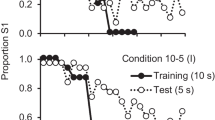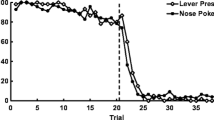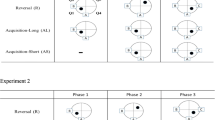Abstract
Three groups of rats in three related experiments were used to test the effect of allowing withdrawal from the empty end box on the nonreinforced trials of a partial reinforcement runway situation. During acquisition the rats in one partial reinforcement group were permitted to retrace on the nonreinforced trials, whereas rats in the other partial reinforcement group were not. This no-retrace group and a continuous reinforcement group served as controls. In a well-differentiated alley in Experiment 1, the retrace group ran significantly slower during acquisition than both control groups. In Experiment 2 the runway response was subdivided into start, alley, and goal speeds and the retrace group ran slower in each section. Alley cues and extra-maze cues were removed in Experiment 3, which eliminated inhibition in the retrace group. When retracing from nonrein for cement is permitted this response appears to compete with reinforced approach, but only in a well-differentiated alley when withdrawal from nonreinforcement clearly occurs in a direction opposite to approach.
Similar content being viewed by others
References
ALLISON, J. 1967. Time spent in the goal box: Effects of frequency and schedule of reinforcement. Psychonomic Science, 7, 165–166.
ADELMAN, H.M., & MAATSCH, J.L. 1955. Resistance to extinction as a function of the type of response elicited by frustration. Journal of Experimental Psychology, 50, 61–65.
AMSEL, A. 1962. Frustrative nonreward in partial reinforcement and discrimination learning. Psychological Review, 69, 306–328.
BADIA, P. 1965. Effects of drive, reinforcement schedule, and change of schedule on performance. Journal of Experimental Psychology, 69, 292–297.
BARRETT, G.V., & CARLSON, N.J. 1966. Effect of escape versus non-escape responses from the goal box during extinction. Psychological Reports, 19, 447–454.
DENNY, M.R. 1971. A theory of experimental extinction and its relationship to a general theory. In H.H. KENDLER & J.T. SPENCE (Eds.), Essays in neobehaviorism: A memorial volume to Kenneth W. Spence. New York: Appleton-Century Crofts.
DENNY, M.R., & ADELMAN, H.M. 1955. Elicitation theory: I. An analysis of two typical learning situations. Psychological Review, 62, 290–296.
FREIDES, P. 1957. Goal-box cues and pattern of reinforcement. Journal of Experimental Psychology, 53, 361–371.
GELLERMAN, L.W. 1933. Chance orders of alternating stimuli in visual discrimination experiments. Journal of Genetic Psychology, 42, 207–208.
GOODRICH, K.P. 1959. Performance in different segments of an instrumental response chain as a function of reinforcement schedule. Journal of Experimental Psychology, 57, 57–63.
HAGGARD, D.F. 1959. Acquisition of a simple running response as a function of partial and continuous schedules of reinforcement. The Psychological Record, 9, 11–18.
HULSE, S.H., Jr. 1958. Amount of percentage of reinforcement and duration of goal box confinement in conditioning and extinction. Journal of Experimental Psychology, 56, 48–57.
JOHNSON, C.M., & DENNY, M.R. 1979. Effect of withdrawal from the negative cue on learning a two-choice discrimination. The Psychological Record, 29, 85–91.
LEWIS, D.J. 1960. Partial reinforcement: A selective review of the literature since 1950. Psychological Bulletin, 57, 1–28.
LOGAN, F.A., & WAGNER, A.R. 1965. Reward and punishment. Boston: Allyn & Bacon.
MARX, M.H. 1967a. Resistance to extinction as a function of delay of reinforcement and the opportunity to retrace in the runway. Psychonomic Science, 8, 387–388.
MARX, M.H. 1967b. Increased resistance to extinction as a function of the opportunity to retrace in the runway. Psychonomic Science, 9, 397–398.
MCCOY, D.F., & MARX, M.H. 1965. Competing responses and the partial reinforcement effect. Journal of Experimental Psychology, 70, 352–356.
ROBBINS, D. 1971. Partial reinforcement: A selective review of the alleyway literature since 1960. Psychological Bulletin, 76, 415–431.
TOMBAUGH, T.N. 1966. Resistance to extinction as a function of the interaction between training and extinction delays. Psychological Reports, 19, 791–798.
WAGNER, A.R. 1961. Effects of amount and percentage of reinforcement and number of acquisition trials on conditioning and extinction. Journal of Experimental Psychology, 62, 234–242.
WEINSTOCK, S. 1958. Acquisition and extinction of a partially reinforced running response at a 24-hour intertrial interval. Journal of Experimental Psychology, 56, 151–158.
Author information
Authors and Affiliations
Additional information
Experiment 1 was reported by M. Ray Denny at the Midwestern Psychological Association meeting, Chicago, 1977. Experiments 2 and 3 are based on part of a dissertation submitted by C. Merle Johnson in partial fulfillment of the requirements for the PhD degree at Michigan State University
Rights and permissions
About this article
Cite this article
Johnson, C.M., Denny, M.R. Inhibition of Performance as a Function of Withdrawal from Nonreinforcement in a Partial Reinforcement Situation. Psychol Rec 32, 315–327 (1982). https://doi.org/10.1007/BF03394791
Published:
Issue Date:
DOI: https://doi.org/10.1007/BF03394791




